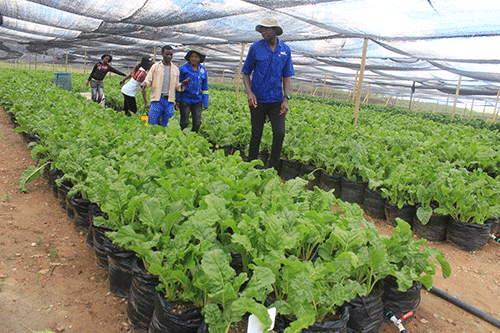Uundenge Agri Farm is one of the few social development initiatives that aims to alleviate poverty and contribute to food security in the country.
New Era visited the farm nestled north-east of Windhoek near Ongos valley.
Established by local businessman Laban Kandume and Swapo Party Youth League (SPYL) secretary Ephraim Nekongo last year, the project was founded to solve food insecurity, boost the local economy and provide fresh, affordable food to residents.
“This project also intends to provide a sustainable solution to low agricultural production and food insecurity in the country,” explained Nekongo.
Nekongo, who also owns several horticulture projects in the northern part of the country, said Uundenge Agri Farm targets the problem of expenses the government spends on food imports from other countries.
“We cannot keep importing vegetables from other countries. Imagine importing spinach or tomato from Cape Town while we have our land and soil where we can also produce our own food,” complained Nekongo, adding that with Uundenge Agri Farm, they plan to expand the status of farming in Namibia beyond the current level of subsistence to a production system that creates sustainable commerce, thereby producing jobs and improving the health of communities.
Nekongo believes the agricultural sector is deserted, as many farmers lack the necessary information to enable them to progress.
“They don’t know what the market wants or where to get funding for their projects, some also don’t know what the best management practice is,” said Nekongo, further urging the government to confront the challenges these farmers face.
He further added that many young people don’t often view the agricultural sector as a viable and economically sustainable career path, saying that is an oversight that could threaten the future of food production in the country.
“Food alone is a multi-billion-dollar industry,” he said.
Started from scratch
According to Nekongo, the farmland which is owned by Kandume was not previously occupied. “We started everything from scratch. Cleared the land and did all the setup and who would have thought a bushy and rocky area can be turned into a farm,” Nekongo said of the 15-hectare piece of land that provides food for over 100 families.
Sustained by three young farmers and a larger crew of casual workers, the farm produces over six types of crops such as tomatoes, chilli, spinach, green peppers, sweetcorn, rep, pumpkin, and maize, which are harvested on a pick-your-own basis.
On the farm, there are also a few livestock to provide manure to the crops.
Additionally, the farm hosts educational opportunities, including compost building, organic growing, and vegetable preservation training to their workers.
Innovations on the farm include pivot-drip systems that combine the efficiency of surface drip irrigation with the flexibility and cost-effectiveness of mechanised irrigation systems and integrated sensors to monitor soil and plants. “Through our training, we also empower the workers,” explained farm manager Stephanus Petrus. Although the farm has just been in operation for three months, Petrus said they already supply food in Windhoek and beyond. “Currently we have harvested spinach, kale, chilli, and supply to residents in Windhoek, Walvis Bay, Otjiwarongo, and Oshakati,” he said.
Cultivating back
Another objective of Uundenge Agri Farm is to support the diversification of livelihoods to improve the incomes of farmers. They have so far provided employment opportunities to 63 workers from around Windhoek. “We hope to create more job opportunities for our community members,” Nekongo said.
Talking to New Era, 22-year-old Felicia Ishinawa a migrant worker, said she had financial difficulties until she was employed at Uundenge Agri Farm. “I can now provide for my household needs. I have also gained the necessary knowledge in agriculture,” she said candidly. Iiyambo Ananias, a graduate from the University of Namibia, who works as a crop scientist encouraged fellow young people to join the agriculture sector, saying that it will help revive the economy. “Agriculture is going to solve future problems of our generation,” he stated.
Agriculture is one of Namibia’s most important sectors. The country’s commercial guide indicates that the majority of Namibia’s population is dependent directly or indirectly on the agricultural sector for their livelihoods, however, over the last five years, the contribution of the sector to GDP (excluding fishing) has been just over 45.
-ashikololo@nepc.com.na


